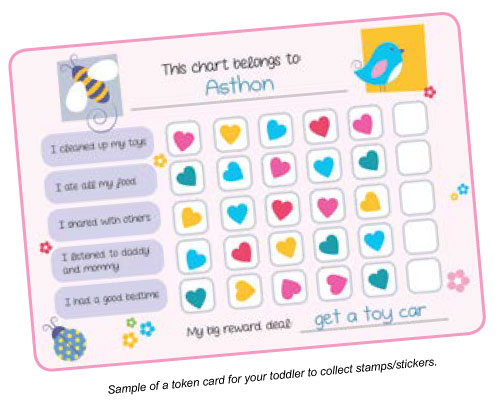Is your toddler driving you up the wall with inappropriate behaviour? Do you find that timeouts are no longer as effective as they were before? In the first place, you should be aware that if time-outs no longer have the desired effect, it means that you have not been doing it correctly or rewarding good behaviours sufficiently, or both.
When it comes to behaviour management, timeouts should not be the first method of choice. Although it is a form of discipline intended to reduce behaviour, psychological research has shown that the effects of reward and punishment are not symmetrical – rewards increase behaviour while punishments do not necessarily decrease behaviour.
A Cry for Attention
Remember that your toddler craves your attention. If you do not spend enough time with him, then he may settle for negative attention by behaving in an inappropriate manner. Rather than waiting for this to happen, you should instead focus on using rewards for behavioural management.
It is by far better to reinforce or strengthen the behaviours that you want rather than relying on punishment to dissuade or stop inappropriate behaviours. The idea behind this is that inappropriate behaviours would occur less frequently, as they would be replaced by appropriate behaviours.
Did you know?
Punishments have three main side-effects, namely anger, fear, and resentment. If you do intend to use punishments, be prepared for these side-effects and learn how to manage them. Otherwise, it may lead to more problems.
Positivity is Better
Since punishments such as time-outs don’t always work, don’t be afraid to change your parenting strategy! Start off by focusing more on positive-focused behaviour management techniques that strengthen the behaviours you want to encourage.
Tell your toddler what you want or expect and be specific – take care not to mention the behaviour that you do not want. Take note of even the smallest positive change (such as when he uses his napkin or spoon even if it was just once). Comment on it positively because children tend to increase the behaviour which gets them more attention.
Redirection and Reinforcement
Words such as “No” or “Don’t” tend to be overused (e.g. “Don’t run!”, “Don’t touch that!”, “No! Put it back!”), and he may just end up tuning those words out. Instead, redirect his energy and attention somewhere else. You can easily do this by suggesting an activity that you would rather have him doing.
For example, if he starts doing something he’s not supposed to when you are out shopping, tell him you need his help and let him select the groceries or be in charge of arranging the items in the shopping cart. This helps redirect his attention from whatever inappropriate behaviour he was about to indulge in, to something that is more appropriate.
Use the Carrot, Not the Stick
Rewarding positive behaviour helps to reinforce it. Rewards can be in the form of a hug, a lollipop, or a toy. Alternatively, you can also consider using praises and encouraging words as rewards for your toddler. Make sure that you are specific and sincere with your praises, e.g. instead of saying “Good job”, say “It was wonderful that you shared your toys with your sister.”
When giving him material rewards, you should also put some thought into it. Too long a period between rewards and he may feel discouraged, but receiving a reward too often could cause him to expect a reward every time. Often just a simple acknowledgement of the behaviour is enough.
Beware!
The reward method can back-fire when used wrongly. For instance, if your toddler starts misbehaving during a shopping trip and you try to get him to behave by giving him a lollipop, you are ‘rewarding’ the wrong behaviour. This act would only encourage him to misbehave in future as he will link it to his ‘reward’ (or, more accurately, his ‘bribe’).
Taking Rewards to the Next Level
As constantly handing out rewards is not a good idea, you may want to consider using a different method known as the token economy. This method helps motivate your toddler to maintain specific acts or behaviours by allowing him to earn small rewards (i.e. a token such as a stamp sticker) each time he performs it (e.g. brushing his teeth or putting his toys away before bedtime).
After he has collected a certain number of stickers, he can then ‘redeem’ his main reward, which could be a trip to the cinema for a movie of his choice or something else that he wants.
Lastly, remember that in order for any kind of reward to be effective, it should be something that your toddler values or wants. Remember, what you think is a good reward may not be what he wants, so make it a point to get his point of view when considering what reward to give him. It is also important to gradually phase out tangible rewards and token economy once the behaviours are more regular. You don’t want your children to become dependent on them.
An educational collaboration with Malaysian Society of Clinical Psychology.









Comments